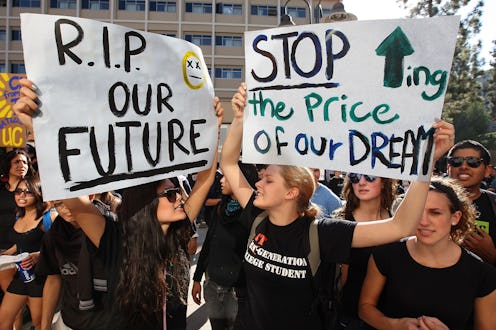News
Why These 7 States Will Help You Pay Your Student Loans

Some 70% of American graduates leave college with student debt. In fact, Americans owe roughly $1.4 trillion in student loan debt, according to the Federal Reserve. Now, some states are offering a remedy, saying they'll pay back the student loans of those who move.
After school is finished, many graduates relocate to take advantage of regions with lower taxes and lower living expenses to pay off debt. If the latest news is any indication, these regions are catching on to the trend and using it to attract more recent graduates. OZY reports that Michigan is now offering to help pay for newcomers' housing costs, while a Memphis program will pay $50 per month to cover the loans of those who have worked for the city for at least one year. Furthermore, a law in Kansas designates 77 counties as Rural Opportunity Zones, which provide "a 100% state income tax waiver for up to five years and repayment of up to $3,000 per year ($15,000 maximum) in outstanding student loans."
New York is helping pay for college, too, with its Excelsior Scholarship, a program that offers tuition-free college at all CUNY and SUNY two- and four-year colleges. The offer is valid for middle-class families and individuals making up to $125,000 per year.
A number of states offer loan repayment for specific industries, too. Alaska offers a program for qualified health care workers willing to live and work in areas with higher-needs populations, and will pay up to $35,000 in qualified federal or private student loans for up to three years. California has a similar program, which offers up to $50,000 per year in loan repayment for those willing to commit to a two-year role in an underserved area.
In North Dakota, a select number of licensed veterinarians receive up to $80,000 in loan repayments through completing a two-, three- or four-year commitment in a high-need area.
Even among states without debt-repayment programs, those with no income tax are seeing an influx of recent graduates too. In fact, a survey by Student Loan Hero found that 18% of respondents would move to a state with no income tax in order to save money.
Currently, student debt is the largest source of household debt aside from mortgages. And as debt levels rise, so do defaults on that debt. And when it comes down to it, unpaid student loans are sometimes more than just a financial burden. In some cases, for instance, they've even led to people losing their jobs. A November investigation by the New York Times found that 20 states have suspended people’s professional or driver’s licenses for falling behind on loan payments.
Tennessee was found to be one of the most aggressive states in terms of revoking licenses, with officials reporting at least 5,400 people who hadn't paid back their student loans to licensing agencies between 2012 and 2017. It is unclear how many of those people actually lost their licenses as a result.
This may have you asking what the state itself has to gain by paying for a portion of your student loan. Ultimately, college loan debt doesn't just impact the people paying it off — it can also affect states looking to retain graduates and skilled workers. As OZY notes, for example, Pennsylvania has the second-highest student debt in the nation and saw a loss of some 13,000 educated millennials in 2014. And that's bad news. The more people move to an area, the more desired it becomes. On top of that, an influx of young minds gives a state or city the opportunity to compete in different industries, whether it's computer programming, teaching, or health care. And last but not least, more people means more money spent in that area's local economy.
Of course, the large majority of those who have student debt obligations likely won't have access to a loan repayment program like the ones mentioned above. For them, the only option is to pay back student loans in full, or to qualify for an income-driven repayment plan or a Public Service Loan Forgiveness plan. And seeing as the House Republicans' new tax reform bill counts tuition waivers as taxable income, it's not making the situation for grad students any better.